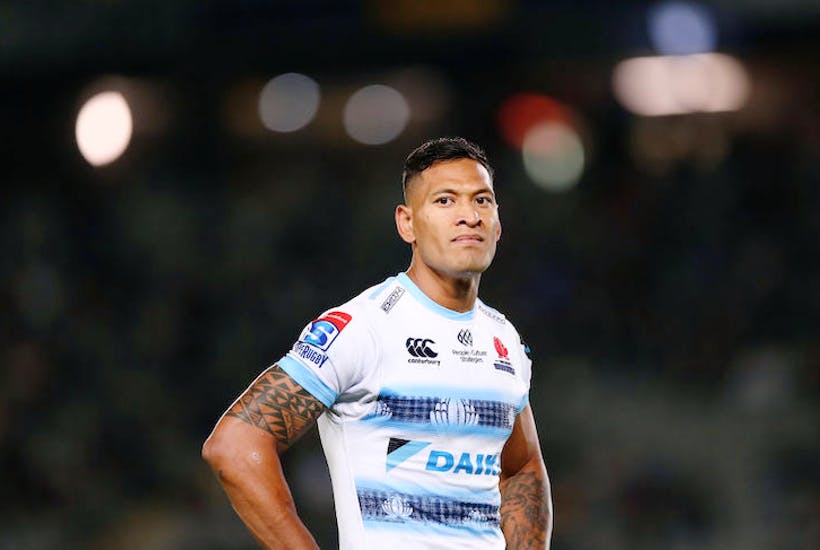Israel Folau settled his multi-million dollar grievance with Rugby Australia last December after he was sacked over a social media post that summarized a Bible passage. The settlement came despite Rugby Australia’s insistence that they had acted within their rights in sacking Folau, although it wasn’t clear whether he would ever play rugby again. A joint statement released at the time included apologies from all parties for ‘hurt or harm’ caused, but subsequent comments from players and rugby executives in Australia seemed to rule out the possibility of Folau’s return to any Australian team.
Folau was unquestionably one of the best rugby players in the world at the time of his sacking — a talent that most teams would dream about having on their roster. A month after the historic settlement was reached, the Catalan Dragons — a rugby league team based in Perpignan, France – announced they had signed Folau as part of a one year deal.
The club’s chairman said that while they did not share or condone the views Folau had expressed on social media, he wanted to give him ‘a new opportunity to shine on the pitch’. It was also revealed that his contract contained a clause that would trigger an immediate termination of employment should Folau publicly express similar views in future.
Despite the assurances that Folau would not be making any further public comments about his religious views — which represented a surprising climbdown from the outspoken player — the move was met with heavy resistance from players, clubs and the sport’s governing bodies. Super League chairman Robert Elstone released an extraordinary statement which went as far as suggesting that the League would have blocked the move if it had the power to do so. He went on to acknowledge that in the absence of any criminal offense being committed, the ‘moral responsibility’ for the decision sat with the club.
Rival team Wigan Warriors initially responded to the announcement by saying that their scheduled home match against the Dragons would be a ‘Pride Day’ to celebrate the LGBT community, complete with rainbow laces and socks. And, in a far more serious move this past week, a leaked letter to BBC Sport revealed that Hull Kingston Rovers had threatened legal proceedings against the Dragons if Folau’s signing led to any financial loss on their part. The threat was reported to be endorsed by several other Super League clubs, heaping huge pressure on the Dragons to sack Folau, even though no league sponsors have indicated that they will stop funding the sport.
Most recently, the Super League announced that it was changing its rules to ensure that teams would be able to veto ‘controversial’ signings in future. In a statement, the League said ‘as a sport we have an impressive and enviable track record when it comes to equality, diversity and inclusion and we will continue our great work in those areas.’
For all of the posturing, the League seems to be oblivious to the fact that equality, diversity and inclusion has been thrown out of the window in relation to Folau himself. This is an athlete who reportedly received millions from Rugby Australia to settle a landmark case of religious discrimination, and who committed to self-censor his views whilst playing for the Dragons. Nevertheless, the League has gone out of its way to make clear that his views, regardless of whether they are expressed or not, are simply not welcome in the game. What started as censorship of speech in Australia seems to have taken a dangerous lurch towards censorship of thought in Europe.
While you might think that missing a World Cup and never being able to play for the Australian national team again would be punishment enough, some have argued that Folau shouldn’t be given a second chance anywhere because he hasn’t shown enough remorse. While the ‘he is entitled to his beliefs’ line is frequently trotted out, one wonders if there is anything Folau could say or do short of publicly renouncing his beliefs that would atone for his perceived transgressions.
Unable to legally block Folau’s re-entry into the sport (most likely because such a move would again amount to religious discrimination) those who find his views offensive have sought to exact as much pressure as they possibly can on the Dragons to ‘cancel’ him. This is a strategy that the airline Qantas — Rugby Australia’s biggest sponsor — used to great effect at the beginning of the Folau case. Quite clearly, it is the antithesis of tolerance. It is open, active and unabashed hostility against Folau and what he believes.
Tolerance is a two-way street. While some will find Folau’s views offensive, the Super League seems completely unconcerned that others will be appalled by the international witch-hunt he has been subjected to for expressing his beliefs. And although Folau has been accused of bigotry, those pushing for his permanent removal from the sport are displaying the clearest prejudice. For now, the Catalan Dragons are standing by their decision to hire Folau despite the unrelenting pressure. For the sake of genuine equality, diversity and inclusion in the sport, let’s hope they stand firm.
Laurence Wilkinson is Legal Counsel with ADF International. This article was originally published on The Spectator’s UK website.



















